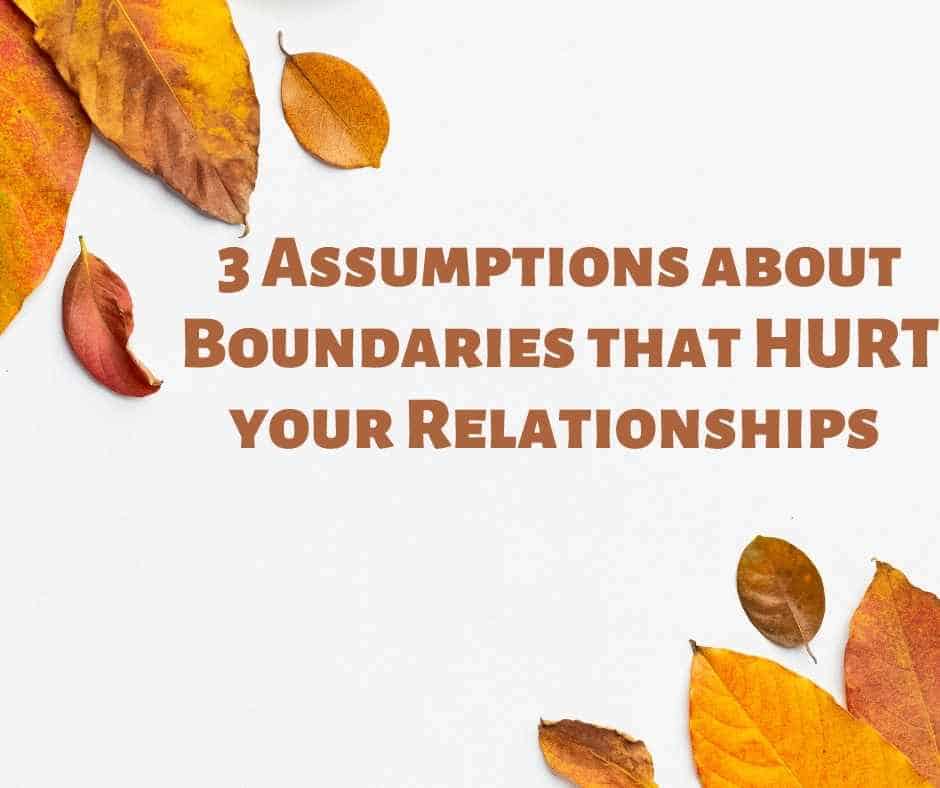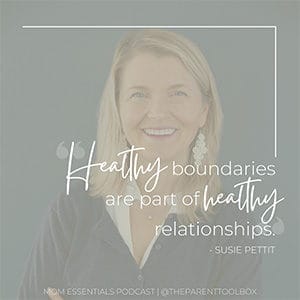Podcast: Play in new window | Download
Subscribe: Apple Podcasts | Spotify | Amazon Music | RSS | More
Trouble Setting Boundaries
Boundaries are non negotiable in healthy relationships yet we get into trouble setting boundaries when we make these three assumptions.
This week on the podcast I share the three main assumptions that give us trouble setting boundaries. These are three assumptions that I have made that got me into trouble setting boundaries each and every time. I am so excited for you to learn these assumptions. Why? Because I also give the counter tools so you can stop having trouble setting boundaries.
Trouble Setting Boundaries Assumption Number One
The first assumption we make is we assume the other person operates by the same set of values and guidelines as we do. We assume we know how they’ll respond. The challenge is, they’re not us. They don’t think like us. Further, when we make the assumption of how they will react based on how we would react, we have trouble setting boundaries. We may think we are doing something wrong.
The tool to get around this boundary pitfall is to practice thinking the thought “not everyone thinks like me”. Truly. Instead of trying to figure out why people aren’t doing what you would be doing in their shoes or, trying to future cast the conversation. Remind yourself of this golden thought: Not everyone thinks like you. (and then open your mouth and clearly state your boundary.)
Trouble Setting Boundaries Assumption Number Two
The second assumption is we think the other person will understand (and ultimately agree with) why we’re setting the boundary. Oooh this is a hard one warriors. We want them to understand and agree so bad, no?
I offer many real life examples of where I and my clients make this assumption in this week’s podcast. Make sure to listen in as real life examples are so helpful. Begin to pay attention to where you are making this assumption in your relationships. Where are you talking and explaining and defending your boundary with the assumption that if you talk long enough, the other person will understand. That’s not the point. Other people don’t think like you so they may never see the need for you to have the boundary you have.
This counter tool here is to expect resistance and not engage. Notice where you want to go DEEP with your boundary. Choose to close your mouth. Expect them to resist. To think you’re wrong. Again, listen tot he podcast for specific examples of how this has shown up in my life as that will be helpful for you. If you want help setting your own boundaries, join the monthly membership or schedule a coaching session. We can knock it out.
Trouble Setting Boundaries Assumption Number Three
The third boundary pitfall is we assume that once we say the boundary or guideline once, we’re done. We work up all this courage and say the boundary and then think: “ah well, that’s done. “
Nope! The reverse is usually true. My guess is that a lot of your relationships are used to you having relaxed boundaries or even none at all. Thus, the first 1, 2, 10 times that you state a boundary, the other person won’t be used to you having guidelines for how to treat you.
The counter tool for this boundary assumption is patience. Adopt a growth mindset. Remind yourself not everyone thinks like you. Expect the resistance. And then, practice patience. Restate your boundary. Expect that you will need to restate it numerous times. The longer you’ve been in relationships with someone, the more you’ll likely need to restate it.
Do you see how wonderful this is? You don’t have to hate them or be irritated or annoyed by them to set a boundary. We don’t have to be angry to take an action or set a boundary in your life that serves you. You can love them and speak up for yourself.
Listen in to the Episode Here
If you got anything out of this post, you’ll want to listen to the episode because I give tons of real world examples to help you see where assumptions might be causing trouble setting boundaries for you too!
Support Mentioned
I consider myself a boundary expert – not only have I been formally trained in boundary setting and relationship coaching, I have lived this. I have had trouble setting boundaries. In fact, I’ve set some of the hardest boundaries there are to set and have come out the other side stronger and in healthy relationships. So please keep emailing, listening to the podcast and reaching out for support. Healthy boundaries are a part of all healthy relationships. They’re wonderfully freeing once we refine our skill at setting them and yet they’re not things that were modeled when we were growing up.






